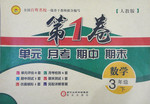题目内容
英语知识运用
If failure is like a day without the sunshine, I’ll still smile at it, as clouds may be dancing in the sky. Success does not _________ every person, just like the sun doesn't shine every day.
Do you give up your plan to go hiking _________ because the weather isn't as good as you had hoped? No, of course not. I would rather go on trying no matter what I _________ and enjoy on the way to my destination (目的地) .
_________ , failure is like a naughty boy who plays with us on the way to our goals. Not only does he want to _________ us, but he wants to help us become braver. The more we _________ , the braver we'll be.
If failure is the _________ without the moon, I'll still smile at it, as stars may twinkle on us still. _________ . we all like the moon, but should we ignore the stars? There is always something more important than _________ . In other words, we shouldn't only _________ on whether we succeed or fail. In fact. we learn a lot from failure. It is really helpful. The more we learn from failure, the _________ we'll be.
If failure is a bird without _________ , I'll still smile at it. Flying isn't the only thing a bird can do. If we can't be _________ by the wide blue sky, why don't we _________ adapting ourselves to the forest through our beautiful singing? Failure _________us that we should believe in ourselves. We may fail in one area, but we may_________ in another. Maybe we’ll find that we have a talent for something whenever knew about before. Who _________ ?
Life is like a box of chocolates, and you_________ know what you're going to get. Just keep on trying. The process of trying is much more valuable than the _________ .Smile at _________ and smile at life.
1.A. meet B. know C. favor D. see
2.A. even B. still C. too D. just
3.A. suffer B. hate C. dislike D. fear
4.A. Generally B. Unluckily C. Actually D. Naturally
5.A. beat B. change C. test D. frighten
6.A. laugh B. cry C. play D. smile
7.A. day B. night C. sky D. place
8.A. In fact B. Of course C. In deed D. In turn
9.A. aim B. joy C. success D. work
10.A. live B. focus C. depend D. base
11.A. nicer B. healthier C. wiser D. younger
12.A. legs B. feet C. teeth D. wings
13.A. received B. accepted C. noticed D. covered
14.A. try B. begin C. appreciate D. enjoy
15.A. suggests B. insists C. reminds D. orders
16.A. forget B. start C. stand D. achieve
17.A. sees B. knows C. believes D. does
18.A. never B. already C. usually D. always
19.A. methods B. success C. victories D. results
20.A. defeat B. sorrow C. failure D. loss
 第1卷单元月考期中期末系列答案
第1卷单元月考期中期末系列答案
